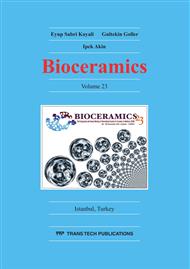p.355
p.361
p.366
p.370
p.375
p.381
p.387
p.391
p.397
Antibacterial Activity In Vitro of the Developed Glass Ionomer Cements
Abstract:
The purpose of the study was to identify the influence of the amount of fluoride release from glass ionomer cements on survival of bacterial strains responsible for the development of secondary caries. All developed cements had an antibacterial impact on the strains used in the study. The study demonstrated that the cements exhibit greater antibacterial activity against Streptococcus mutans than Streptococcus sanguinis. The numbers of bacteria count in cultures on the developed cements were approximately 10 times lower compared to the control culture after 24 h, 48 h, 72 h and 7 days. The developed cements had initially (1-2 days) greater antibacterial impact against the strains used in the study, which corresponds to the greatest daily amount of fluoride released from the cements. Following the initial period, the antibacterial activity of all the cements remained roughly at the same level.
Info:
Periodical:
Pages:
375-380
Citation:
Online since:
October 2011
Price:
Сopyright:
© 2012 Trans Tech Publications Ltd. All Rights Reserved
Share:
Citation:


